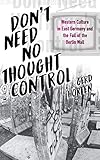Don't Need No Thought Control : Western Culture in East Germany and the Fall of the Berlin Wall / Gerd Horten.
Material type: TextPublisher: New York ; Oxford : Berghahn Books, [2020]Copyright date: ©2020Description: 1 online resource (268 p.)Content type:
TextPublisher: New York ; Oxford : Berghahn Books, [2020]Copyright date: ©2020Description: 1 online resource (268 p.)Content type: - 9781789207330
- 9781789207347
- Alltagskultur
- Berlin Wall, Berlin, Germany, 1961-1989
- Deutschland
- Germany (East)-Foreign relations
- Konsumgesellschaft
- Massenmedien
- Political culture -- Germany (East)
- Popular culture -- Germany (East)
- HISTORY / Europe / Germany
- History: 20th Century to Present, Media Studies, Cultural Studies (General), Film and Television Studies
- 327.431 23
- DD261.4 .H678 2020
- online - DeGruyter
| Item type | Current library | Call number | URL | Status | Notes | Barcode | |
|---|---|---|---|---|---|---|---|
 eBook
eBook
|
Biblioteca "Angelicum" Pont. Univ. S.Tommaso d'Aquino Nuvola online | online - DeGruyter (Browse shelf(Opens below)) | Online access | Not for loan (Accesso limitato) | Accesso per gli utenti autorizzati / Access for authorized users | (dgr)9781789207347 |
Frontmatter -- Contents -- List of Illustrations -- Acknowledgments -- Introduction. Disempowering a Dictatorship: Media and Consumer Culture in East Germany -- Chapter 1. Successful Media Campaigns in East Germany in the 1960s and 1970s: The Vietnam War and the 1972 Olympics -- Chapter 2. Fade Out: Hollywood Movie Imports and the Cultural Surrender of the GDR Film Control in the 1970s and 1980s -- Chapter 3. The Westernization of East German Television in the 1970s and 1980s -- Chapter 4. Fighting against All Odds: GDR Popular Music and Youth Radio in an International Context -- Chapter 5. Western Consumer Culture or Bust: Intershops and East German Consumption Policies in the 1970s and 1980s -- Epilogue. Out with the Old—in with the New? Wende, Ostalgie, and the Serpentine Unifi cation -- Bibliography -- Index
restricted access online access with authorization star
http://purl.org/coar/access_right/c_16ec
The fall of the Berlin Wall is typically understood as the culmination of political-economic trends that fatally weakened the East German state. Meanwhile, comparatively little attention has been paid to the cultural dimension of these dramatic events, particularly the role played by Western mass media and consumer culture. With a focus on the 1970s and 1980s, Don’t Need No Thought Control explores the dynamic interplay of popular unrest, intensifying economic crises, and cultural policies under Erich Honecker. It shows how the widespread influence of (and public demands for) Western cultural products forced GDR leaders into a series of grudging accommodations that undermined state power to a hitherto underappreciated extent.
Mode of access: Internet via World Wide Web.
In English.
Description based on online resource; title from PDF title page (publisher's Web site, viewed 25. Jun 2024)


